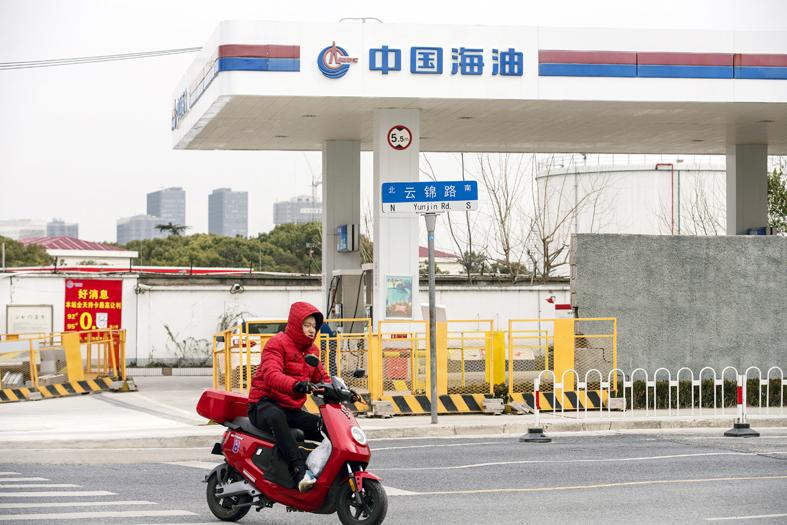US President Donald Trump has signed an order strengthening a ban on US investments in companies with ties to the Chinese military, the White House said on Wednesday, curbing Chinese access to US capital markets days before he leaves office.
Under the amended directive, which was first issued on Nov. 11 last year, US investors would be required to have completely divested their holdings of securities of companies designated by the US Department of Defense as owned or controlled by the Chinese military.
The change expands the scope of the directive, which initially only restricted US investors from buying those securities from that date.

Photo: Bloomberg
“Today’s executive order ensures that the United States retains a key tool to protect US investors from funding Chinese military modernization,” a senior administration official said.
The executive order is part of Trump’s bid to cement his tough-on-China legacy in the waning days of his presidency. It also sought to give teeth to a 1999 law that tasked the defense department with drafting a list of Chinese companies it believes are owned or controlled by the Chinese military.
Among the 35 companies that the department has so far blacklisted are China’s top chipmaker Semiconductor Manufacturing International Corp (中芯國際) and oil giant CNOOC Ltd (中國海洋石油).
Reuters and other outlets earlier on Wednesday reported that the Trump administration had scrapped plans to blacklist tech giants Alibaba Group Holding Ltd (阿里巴巴), Baidu Inc (百度) and Tencent Holdings Ltd (騰訊).
US officials had weighed whether to include the three companies on the trading blacklist due to alleged ties to the Chinese military, but decided against the move, the Wall Street Journal reported.
Alibaba and Baidu trade on the NASDAQ, while Tencent is listed in Hong Kong, where Alibaba also has a secondary listing.
Senior US officials disagreed about whether to ban the three firms from US portfolios, with US Secretary of the Treasury Steven Mnuchin ultimately prevailing in a dispute with US Secretary of State Mike Pompeo, it reported.
The Chinese embassy in Washington did not immediately respond to a request for comment.
Separately, S&P Dow Jones Indices LLC said it would remove oil giant CNOOC securities before Feb.1 due to the US sanctions.
Additional reporting by AFP

SEEKING CLARITY: Washington should not adopt measures that create uncertainties for ‘existing semiconductor investments,’ TSMC said referring to its US$165 billion in the US Taiwan Semiconductor Manufacturing Co (TSMC, 台積電) told the US that any future tariffs on Taiwanese semiconductors could reduce demand for chips and derail its pledge to increase its investment in Arizona. “New import restrictions could jeopardize current US leadership in the competitive technology industry and create uncertainties for many committed semiconductor capital projects in the US, including TSMC Arizona’s significant investment plan in Phoenix,” the chipmaker wrote in a letter to the US Department of Commerce. TSMC issued the warning in response to a solicitation for comments by the department on a possible tariff on semiconductor imports by US President Donald Trump’s

‘FAILED EXPORT CONTROLS’: Jensen Huang said that Washington should maximize the speed of AI diffusion, because not doing so would give competitors an advantage Nvidia Corp cofounder and chief executive officer Jensen Huang (黃仁勳) yesterday criticized the US government’s restrictions on exports of artificial intelligence (AI) chips to China, saying that the policy was a failure and would only spur China to accelerate AI development. The export controls gave China the spirit, motivation and government support to accelerate AI development, Huang told reporters at the Computex trade show in Taipei. The competition in China is already intense, given its strong software capabilities, extensive technology ecosystems and work efficiency, he said. “All in all, the export controls were a failure. The facts would suggest it,” he said. “The US

The government has launched a three-pronged strategy to attract local and international talent, aiming to position Taiwan as a new global hub following Nvidia Corp’s announcement that it has chosen Taipei as the site of its Taiwan headquarters. Nvidia cofounder and CEO Jensen Huang (黃仁勳) on Monday last week announced during his keynote speech at the Computex trade show in Taipei that the Nvidia Constellation, the company’s planned Taiwan headquarters, would be located in the Beitou-Shilin Technology Park (北投士林科技園區) in Taipei. Huang’s decision to establish a base in Taiwan is “primarily due to Taiwan’s talent pool and its strength in the semiconductor

French President Emmanuel Macron has expressed gratitude to Hon Hai Precision Industry Co (鴻海精密) for its plan to invest approximately 250 million euros (US$278 million) in a joint venture in France focused on the semiconductor and space industries. On his official X account on Tuesday, Macron thanked Hon Hai, also known globally as Foxconn Technology Group (富士康科技集團), for its investment projects announced at Choose France, a flagship economic summit held on Monday to attract foreign investment. In the post, Macron included a GIF displaying the national flag of the Republic of China (Taiwan), as he did for other foreign investors, including China-based